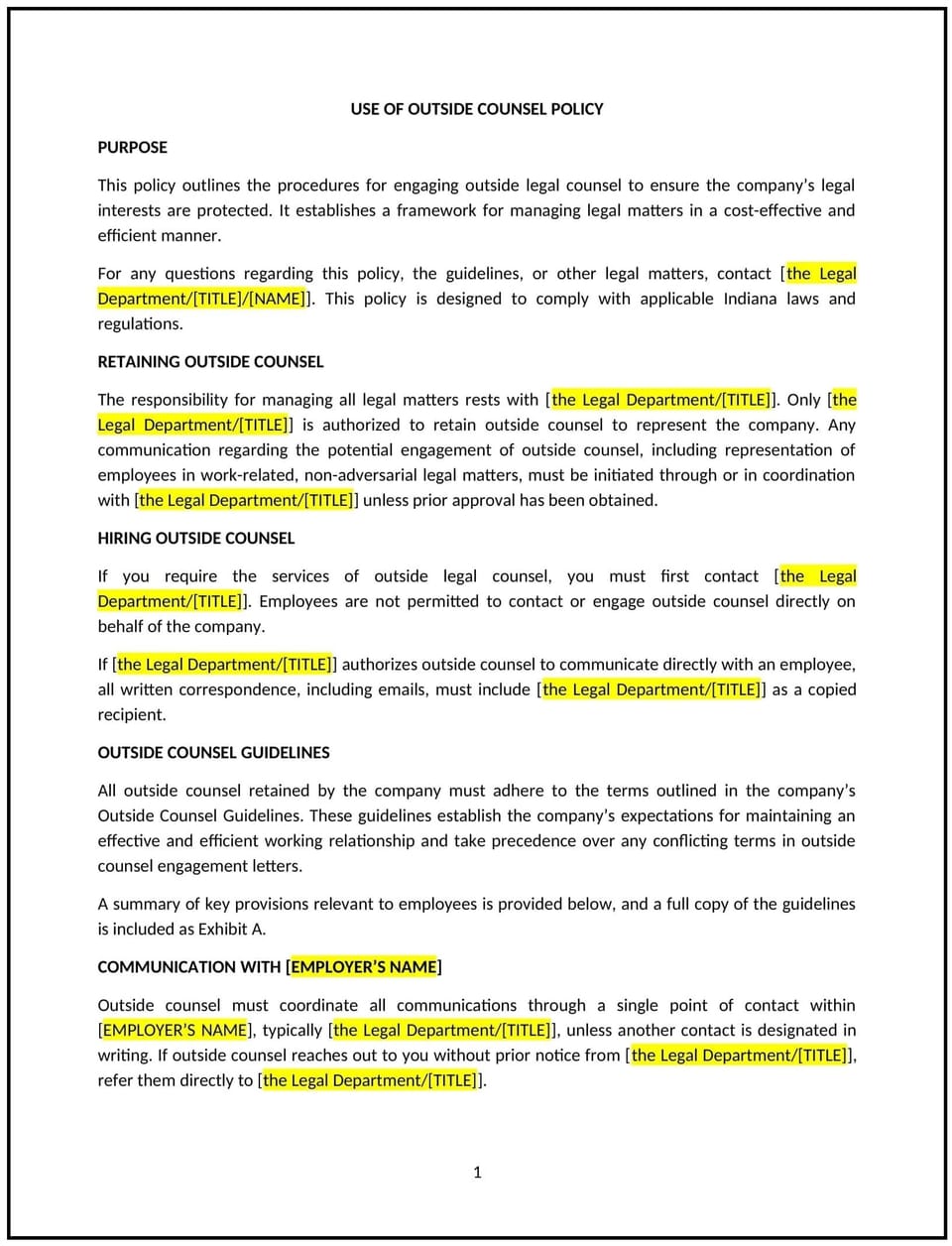Use of outside counsel policy (Indiana): Free template

Use of outside counsel policy (Indiana): Free template
This use of outside counsel policy helps Indiana businesses establish guidelines for engaging and managing legal representation from external law firms or attorneys. It outlines criteria for selecting outside counsel, approval procedures, and expectations for collaboration to ensure efficient and cost-effective legal support. By implementing this policy, businesses can manage legal risks while controlling costs and maintaining operational clarity.
By adopting this policy, Indiana businesses can streamline decision-making, enhance accountability, and foster productive relationships with outside counsel.
How to use this use of outside counsel policy (Indiana)
- Define situations requiring outside counsel: Clearly specify when outside counsel should be engaged, such as for litigation, specialized legal advice, or complex regulatory matters.
- Establish approval procedures: Require employees to obtain prior approval from senior management or the legal department before engaging outside counsel.
- Provide selection criteria: Outline the standards for choosing outside counsel, including expertise, industry experience, reputation, and cost-effectiveness.
- Set communication expectations: Detail how outside counsel should communicate with the business, including regular updates, timelines, and deliverables.
- Include cost management guidelines: Specify procedures for managing legal costs, such as negotiating fees, requesting cost estimates, and tracking billing.
- Address confidentiality requirements: Emphasize the importance of maintaining confidentiality and ensure that outside counsel understands their obligations under Indiana law.
- Define evaluation and termination processes: Include a framework for evaluating the performance of outside counsel and criteria for terminating the relationship if necessary.
- Review and update regularly: Periodically assess the policy to ensure it aligns with changes in legal needs, business operations, or Indiana regulations.
Benefits of using this use of outside counsel policy (Indiana)
Implementing this policy provides several key benefits for Indiana businesses:
- Supports legal risk management: Ensures businesses engage qualified legal experts for complex matters, reducing potential liabilities.
- Enhances cost control: Establishes clear guidelines for managing legal expenses, minimizing unnecessary spending.
- Promotes accountability: Clearly defines roles, responsibilities, and expectations for outside counsel and internal stakeholders.
- Improves efficiency: Streamlines the process for engaging and collaborating with external legal professionals.
- Protects confidentiality: Reinforces confidentiality requirements to safeguard sensitive business information.
- Builds trust: Establishes strong, productive relationships with outside counsel through consistent communication and expectations.
Tips for using this use of outside counsel policy (Indiana)
- Communicate the policy: Share the policy with relevant employees, especially those involved in legal matters or vendor management.
- Maintain a preferred vendor list: Develop and update a list of pre-approved law firms or attorneys to streamline the selection process.
- Monitor costs: Regularly review legal expenses to ensure they align with budget expectations and deliver value.
- Foster collaboration: Encourage open communication between internal teams and outside counsel to align on priorities and objectives.
- Evaluate performance: Periodically assess the performance of outside counsel based on factors such as responsiveness, expertise, and cost-efficiency.
- Stay informed: Keep up-to-date with changes in Indiana legal requirements or industry trends to ensure the policy remains relevant.
Q: When should outside counsel be engaged under this policy?
A: Outside counsel should be engaged for matters requiring specialized legal expertise, such as litigation, regulatory compliance, intellectual property, or high-stakes negotiations.
Q: Who is responsible for approving the engagement of outside counsel?
A: Approval should typically come from senior management or the legal department to ensure alignment with business goals and budget constraints.
Q: What criteria should businesses use to select outside counsel?
A: Businesses should consider factors such as the attorney’s expertise, industry knowledge, reputation, cost structure, and past performance.
Q: How should businesses manage legal costs for outside counsel?
A: Businesses should request cost estimates, negotiate fee structures, and track billing to ensure expenses remain within budget.
Q: How should outside counsel communicate with the business?
A: Outside counsel should provide regular updates on progress, deliverables, and any issues requiring immediate attention, as agreed upon at the start of the engagement.
Q: Can businesses terminate the relationship with outside counsel?
A: Yes, businesses can terminate the relationship if performance is unsatisfactory, costs become excessive, or the legal matter concludes. The policy should outline termination procedures.
Q: How should confidentiality be maintained when working with outside counsel?
A: Businesses should require outside counsel to sign confidentiality agreements and ensure compliance with Indiana laws on client confidentiality.
Q: How often should this policy be reviewed?
A: The policy should be reviewed annually or whenever there are changes in business needs, legal risks, or Indiana regulations.
This article contains general legal information and does not contain legal advice. Cobrief is not a law firm or a substitute for an attorney or law firm. The law is complex and changes often. For legal advice, please ask a lawyer.


